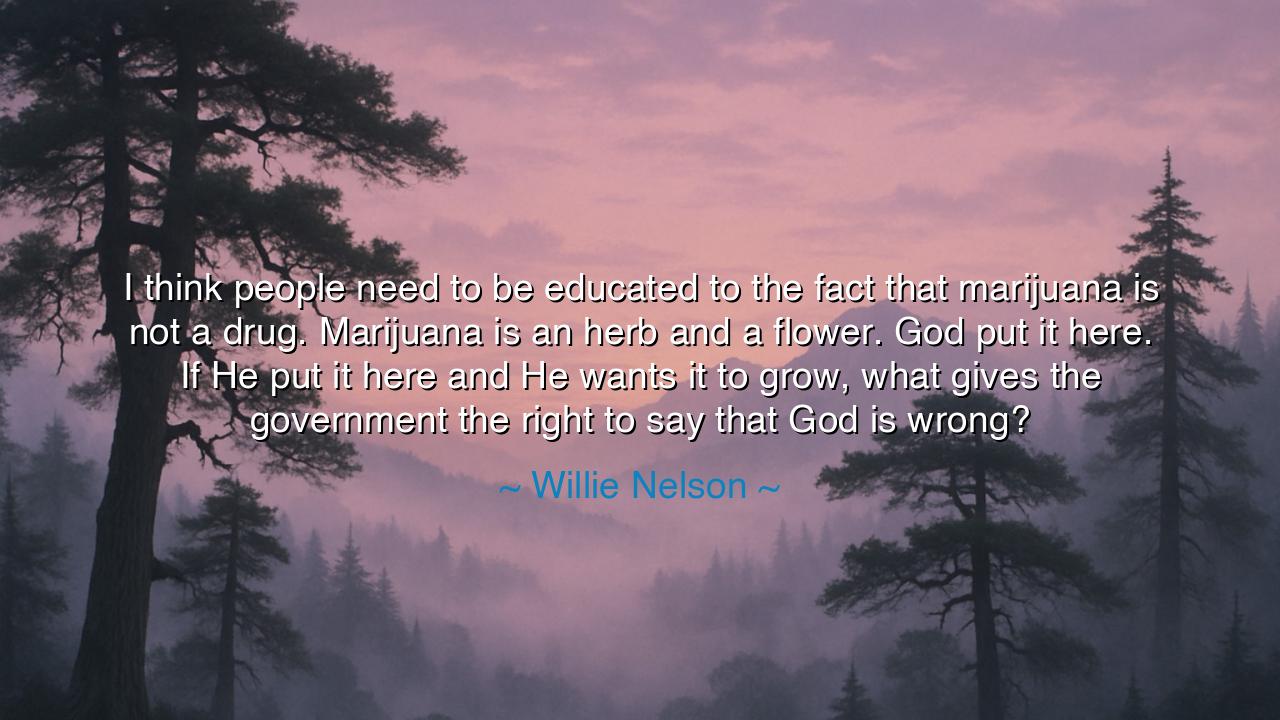
I think people need to be educated to the fact that marijuana is
I think people need to be educated to the fact that marijuana is not a drug. Marijuana is an herb and a flower. God put it here. If He put it here and He wants it to grow, what gives the government the right to say that God is wrong?






The words of Willie Nelson — “I think people need to be educated to the fact that marijuana is not a drug. Marijuana is an herb and a flower. God put it here. If He put it here and He wants it to grow, what gives the government the right to say that God is wrong?” — are spoken not in defiance alone, but in reverence. They are the words of a man who has lived long enough to see how fear and ignorance can be woven into law. Beneath their simple phrasing lies a profound question — one that reaches beyond politics or plants, and into the heart of freedom, nature, and divine purpose. Nelson’s words, though uttered in the voice of a humble troubadour, carry the force of an ancient prophet challenging the arrogance of man-made authority.
The origin of this quote arises from Willie Nelson’s lifelong advocacy for the legalization and destigmatization of marijuana. For decades, the American government has waged a “War on Drugs,” treating cannabis as a threat to society rather than a natural creation. Nelson, a country singer whose soul has always been tied to the land and its rhythms, stood apart from this fear. To him, marijuana was not a menace — it was a gift of nature, a healing herb, as sacred and benign as the wheat that feeds or the vine that gladdens the heart. When he asked, “What gives the government the right to say that God is wrong?” he was not merely defending a plant, but challenging the presumption of human authority over divine creation.
In this, Nelson joins a lineage of thinkers and mystics who have spoken of the harmony between man and the natural world. His argument is, at its core, theological. If one believes that creation itself is the work of God, then all that grows — seed, flower, or herb — bears divine intention. To call any of it evil without understanding is to contradict the very Creator. The ancients, too, revered the earth’s medicines — the herbs that soothed pain, the leaves that calmed the mind. Yet as civilization advanced, fear replaced wisdom, and law replaced reverence. In his simple, rustic way, Willie Nelson rekindles that ancient truth: that wisdom begins with gratitude toward the natural world, not suspicion of it.
To understand the power of Nelson’s words, one must remember the era of prohibition and persecution that surrounded cannabis. From the 1930s onward, propaganda and politics turned the plant into a symbol of crime and immorality. Lives were ruined, communities were imprisoned, and generations were taught to fear what they did not know. Yet while governments declared war on the herb, science and experience whispered another story — that it could ease pain, calm anxiety, and heal the suffering. Nelson stood as a voice of conscience in this wilderness of confusion. His defiance was peaceful, his weapon was song, and his faith was rooted in the belief that nature’s gifts are not to be outlawed, but understood.
The moral of his statement reaches far beyond marijuana. It speaks to the arrogance of human institutions when they presume to dictate what is right or wrong in the order of creation. History is filled with examples of such folly: when governments silenced thinkers, censored knowledge, or persecuted those who lived differently — all in the name of control. Just as the ancient Church once condemned Galileo for proclaiming that the Earth moved around the sun, modern governments condemned a plant because it threatened their power or their fear. In both cases, truth was punished, and wisdom delayed. Nelson’s question pierces this timeless hypocrisy: when human law denies the wisdom of creation, it denies the wisdom of God.
Yet Willie Nelson’s words are not a call for rebellion; they are a call for awakening. He urges humanity to see beyond prejudice and fear — to return to understanding, to compassion, to balance. Education, he says, is the cure — for ignorance, not the herb, is the real poison. To be “educated,” in his sense, is not to memorize laws, but to remember our roots: that we are part of a living earth, and that our role is to nurture, not to dominate. When we learn to see creation as sacred, we cease to fear it — and in doing so, we free ourselves.
So let this teaching be passed down: the wisdom of nature is greater than the pride of man. Do not be quick to condemn what you do not understand, nor to outlaw what you have not studied. Seek harmony with creation, for in it lies both healing and humility. When governments claim dominion over the gifts of the earth, the people must remind them that the laws of God — or nature, if you will — are older, deeper, and truer than any decree.
And thus, remember Willie Nelson’s enduring truth: no man can outlaw what was made in love. Whether one calls it an herb, a flower, or a sacrament, the lesson remains the same — that freedom begins when we honor what is natural, and tyranny begins when we forget. To defend creation is to defend life itself. And to defend life, as Willie teaches, is the first and most sacred duty of all who walk upon this earth.






AAdministratorAdministrator
Welcome, honored guests. Please leave a comment, we will respond soon